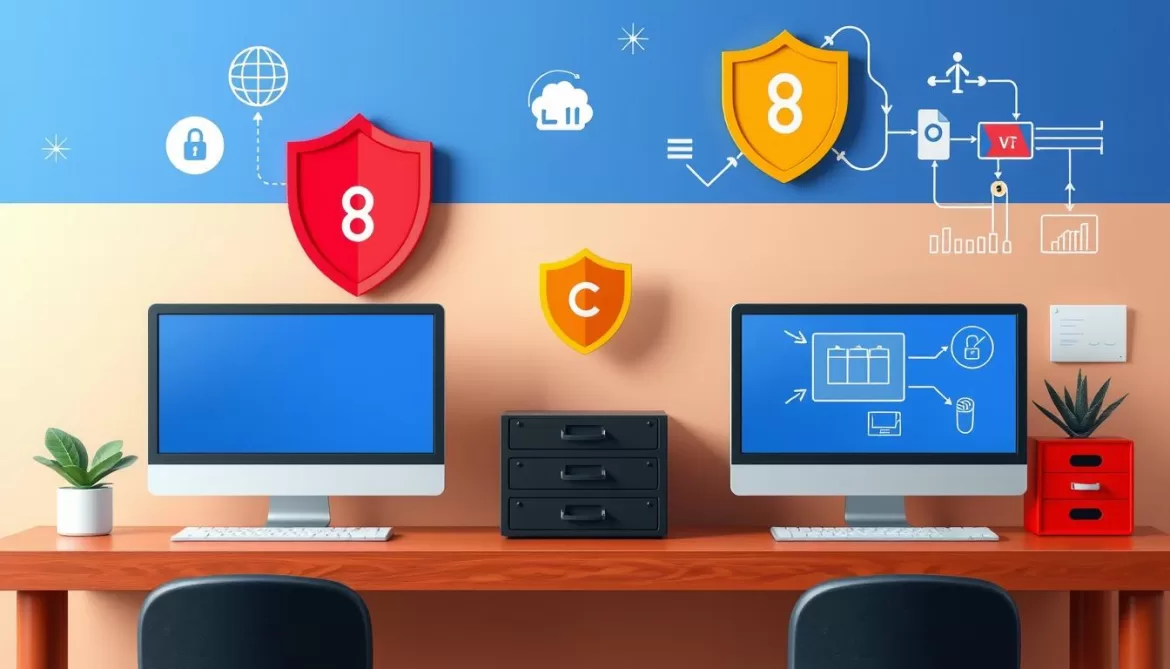The internet can be hazardous for everyone, but this is particularly true for children and teenagers. There is a wide range of internet dangers, from cyber predators to social media postings that may come back to harm them later in life. In this article, we will tell you how to protect your child from the 5 top internet dangers that.
Unintentional virus downloads by children might allow cyber thieves access to their parents’ bank accounts or other personal information. This could put the whole family at risk. The best way to keep children safe online is to educate them about lurking risks and how to avoid them.
The most crucial safety strategy is open communication with your children, even using cyber security software. However, it’s also important to be aware of the top internet dangers that can affect your child. Read about them here and the safety tips that will help you deal with them.

Part 1: What are the five top internet dangers
Here, we present you with the top internet dangers that can impact your child’s future. Let’s read about them in detail.
Danger #1: Cyberbullying
The majority of adolescents, which accounts for 90 percent, agree that cyberbullying is an issue, and 63 percent consider this a significant problem.
In addition, a poll conducted in 2018 on children’s online behavior indicated that roughly sixty percent of children who use social media had been exposed to at least one kind of cyberbullying, and the vast majority of these children choose to ignore the behavior for a variety of reasons.
And as of February 2018, over half of all young people (47 percent), as reported by enough.org, have been the target of cyberbullying at some point in their lives.
Today’s virtual playground is made up of social media platforms and online games; unfortunately, this is also where the majority of cyberbullying occurs, and it is active around the clock. In online interactions, children are vulnerable to being made fun of.
Or, in the context of online gaming, their player identities might be the target of persistent harassment, transforming the experience from creative exploration into public humiliation that could lead to cyberbullying across a variety of online platforms and in real life.
Danger #2: Mental health concerns
Your mental health may not always benefit from using various forms of technology. Children are particularly susceptible to these dangers, such as being addicted to the internet, as well as the related and actual repercussions of such an addiction, such as anxiety and sadness.
Over the last several years, there has been a rise in studies investigating the link between excessive internet usage and mental problems.
In a research published in 1998, the condition that would later be referred to as internet addiction (IA) was characterized as an impulse control issue that did not include the use of an intoxicant.
Internet addiction (IA) refers to a psychological reliance on internet use. IA does not discriminate between the numerous types of activities that take place on the internet but focus solely on the usage of the internet itself.
Internet addiction was a recognized illness in the most recent edition of the Diagnostic and Statistical Manual of Mental Disorders, known as DSM-5.
The primary diagnostic factors for internet addiction are the inability to plan ahead, tolerance, loss of control, and excessive time spent online.

Danger #3: Inappropriate content
Children should not watch many pictures, videos, or information on the internet because it may be violent, sexual, or otherwise unsuitable.
Even when protected searches, parental controls, and content filters are in place, children still commonly come across inappropriate material online.
Lastly, such limits won’t do any good if the youngster knows more about the internet than their parent or guardian.
Sadly, children as young as 8 and 9 years old regularly come into contact with improper information while they are online. Some of the unfortunate results that can be the outcome of such activities are:
- Sexual violence at an early age
- Falling in love traps, drug addictions, etc.
- High exposure to sexual life
- Mental depression at an early age
Danger #4: Damaged reputations
Your kid may inadvertently send an embarrassing message or post a status update, which they may regret sending or updating. This may be devastating to their reputation. Any content uploaded to the internet will be there in perpetuity.
There are situations when it is not feasible to erase such content. Make sure your kid is aware of the everlasting nature of the internet and remind them to be careful about what they post on social media.
According to research conducted by AVG in 2014, one in three youngsters had remorse over anything they did before the age of 16, including using the internet.
This is astonishing, particularly when one considers that once items are posted online, it is quite difficult to remove them from the internet entirely.
Danger #5: Identity theft
The internet has presented identity thieves with unprecedented opportunities to obtain private identifying information, which has contributed to the widespread problem of identity theft on the internet.
You should constantly be alert for warning indicators that identity thieves have targeted your kid since children are among the most prominent targets for identity theft because of their lack of criminal history.
Theft of one’s identity is a very problematic issue. Certain information, such as a child’s social security number, will not be altered under any circumstances.
This puts the youngster at risk for problems that may persist throughout their lives because of the information they were exposed to when they were younger. This may likely result in further long-term concerns, such as harm to the individual’s credit.
Part 2: How to protect your child from the internet in 2024
You can follow the below safety tips to help protect your child from the internet in 2024:
Stage 1: Internet Safety Tips
- Tip 1: Ensure Their Devices Are Updated
There are always new updates for devices. That might be aggravating, but it serves a purpose. Patches will be sent as soon as there is any indication of a security issue.
To keep hackers and other threats at bay, it’s critical to keep devices updated, whether installing a newer operating system version or applying a simple patch.
- Tip 2: Maintain Their Private Information to a Minimum
Schools with a secure login for each student keep everything inside the school’s system. On the other hand, pupils can be taken outside the school’s internet infrastructure while taking online lectures.
Keeping your child’s sensitive information private is essential. This section should not include personal information such as addresses, birthdates, complete names, etc.
- Tip 3: Make Sure That They Visit Appropriate Websites
Your youngster can get on a slew of different websites simply by typing in a single search term. In the URL bar, you can see whether a website is encrypted.
If you see “https” at the end of a web address that begins with “http,” you know it’s secure. It signifies that the website has a security certificate to safeguard its users’ personal information privacy.
Stage 2: How to Protect Your Child from Dangers of Using the Internet with Monitoring App
Other than following the above safety tips, what you can do more is utilize a monitoring app that can help you track your child’s internet activities, such as messages, online conversations, emails, calls, etc.
With mSpy, parents can keep tabs on everything their children do on their phones, including their Snapchat and WhatsApp accounts, text messages, phone calls, and GPS positions. Here’s a step-by-step guide to getting started with mSpy:
Step 1: Fill out the order form for a mSpy subscription. Check your email for installation instructions after making your payment.
Step 2: You may monitor your child’s phone by downloading and installing mSpy’s mobile tracking software. Rooting or jailbreaking your Android or iOS device is required to access premium features.
Step 3: The mSpy Control Panel is where you’ll find all the information you need to keep an eye on your child’s phone.
Conclusion
We hope that you’re now fully aware of the top internet dangers. To protect your child, it’s important that you first recognize what can harm your child and then act on the stoppage measures to ensure your child stays protected. We recommend using mSpy to monitor all the internet activities of your kid!





